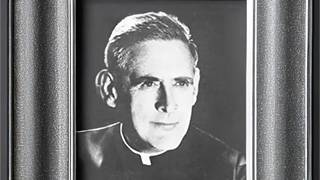From Archives to Action: Monsignor Fahy’s Message Resonates in a New Era
Tuesday, April 29, 2025

Monsignor Thomas G. Fahy
Jon Radwan, Ph.D., associate professor of communication and director of the Institute for Communication and Religion, and Angela Kariotis, an alumna and former instructor in speech communication, recently had their article “Right Out the Gate: A Performative Auto-Ethnography on Race, Place, and Faith” published in Religions, an open-access, peer-reviewed journal on religions and theology.
The article discusses the efforts of Monsignor Thomas G. Fahy, who served as Seton Hall’s president from 1970 to 1976, to create peace and foster collaboration between the Seton Hall community and Newark racial justice activists during America’s Civil Rights Movement.
Director of the University Core, Nancy Enright, Ph.D., commented on the importance of research on Monsigor Fahy.
For many years, I didn’t know anything about the person for whom Fahy Hall on Seton Hall’s campus was named. However, since we have incorporated his presidential inaugural speech into the curriculum of Core I, we have all taken a much longer and detailed look. Doing so, we see that Fahy was a prophetic voice we were blessed to have here at Seton Hall in the early 1970s, complicated times in some ways like these times. Jon Radwan and Angela Kariotis have done a wonderful thing by bringing his voice into the public eye again. He is someone we, at Seton Hall, need to honor in every way.
Radwan and Kariotis consider why Fahy’s contributions toward creating community and shared understanding across cultures had gone largely unrecognized, and how his voice can inform and guide the Seton Hall community into the modern day.
Radwan said, “When Seton Hall Librarian Alan Delozier first gave me a copy of Monsignor Fahy’s 1970 Presidential Inaugural Address, I was amazed at Fahy’s courage and faith. He was directly engaging racial injustices and taking responsibility for ‘irrelevant’ teaching.” He further explained that for generations, “teachers had been enabling ‘complacency’ and regarding suffering neighbors with apprehension and discomfort, rather than care and mercy. We worked with CORE faculty and now, after nearly 50 years sitting unread in the archives, every Seton Hall freshman is introduced to Fahy’s justice leadership.”
By blending autoethnography with oral interpretation, the article seeks to engage with and challenge dominant cultural narratives surrounding identity, race and religious experience. The authors draw from personal experiences to critically analyze the complexities of navigating race and spirituality within contemporary social settings.
For Kariotis, this project extended her commitment to the word of Monsignor Fahy. “His inaugural address is a testimony,” she said. “Invoking his memory offers Seton Hall a memorial imprint and a reminder of who we are. Working on this project with a dear colleague offered the opportunity of community during a time of need. I'm proud of the steps the University has taken to bring Fahy and his ethos to the forefront.”
This publication adds to the growing body of research that addresses intersectionality in religious studies, encouraging a nuanced dialogue on how race and geographical context shape faith practices and beliefs.
About the Institute for Communication and Religion
The Institute for Communication and Religion (ICR) is an affiliated unit within Seton
Hall University’s College of Human Development, Culture, and Media. Religious traditions are primary drivers for social action across humanity’s full
moral range, from care through violence. Launched with THRUST funding in fall 2017,
the ICR is an interdisciplinary nexus for communication and media scholarship addressing
the critical intersection between religion and society. Guided by Nostra Aetate’s
spirit of ecumenical and interreligious cooperation, the Institute seeks to engage
in public dialogue and debate, promote academic inquiry and support religious dimensions
of creativity. Our values are Seton Hall’s values: servant leadership, curricular
innovation and intellectual excellence.
For more information, visit the Institute for Communication and Religion website.
Categories: Faith and Service






